Denvy Deng
MTL-LoRA: Low-Rank Adaptation for Multi-Task Learning
Oct 15, 2024



Abstract:Parameter-efficient fine-tuning (PEFT) has been widely employed for domain adaptation, with LoRA being one of the most prominent methods due to its simplicity and effectiveness. However, in multi-task learning (MTL) scenarios, LoRA tends to obscure the distinction between tasks by projecting sparse high-dimensional features from different tasks into the same dense low-dimensional intrinsic space. This leads to task interference and suboptimal performance for LoRA and its variants. To tackle this challenge, we propose MTL-LoRA, which retains the advantages of low-rank adaptation while significantly enhancing multi-task learning capabilities. MTL-LoRA augments LoRA by incorporating additional task-adaptive parameters that differentiate task-specific information and effectively capture shared knowledge across various tasks within low-dimensional spaces. This approach enables large language models (LLMs) pre-trained on general corpus to adapt to different target task domains with a limited number of trainable parameters. Comprehensive experimental results, including evaluations on public academic benchmarks for natural language understanding, commonsense reasoning, and image-text understanding, as well as real-world industrial text Ads relevance datasets, demonstrate that MTL-LoRA outperforms LoRA and its various variants with comparable or even fewer learnable parameters in multitask learning.
Unleash LLMs Potential for Recommendation by Coordinating Twin-Tower Dynamic Semantic Token Generator
Sep 14, 2024Abstract:Owing to the unprecedented capability in semantic understanding and logical reasoning, the pre-trained large language models (LLMs) have shown fantastic potential in developing the next-generation recommender systems (RSs). However, the static index paradigm adopted by current methods greatly restricts the utilization of LLMs capacity for recommendation, leading to not only the insufficient alignment between semantic and collaborative knowledge, but also the neglect of high-order user-item interaction patterns. In this paper, we propose Twin-Tower Dynamic Semantic Recommender (TTDS), the first generative RS which adopts dynamic semantic index paradigm, targeting at resolving the above problems simultaneously. To be more specific, we for the first time contrive a dynamic knowledge fusion framework which integrates a twin-tower semantic token generator into the LLM-based recommender, hierarchically allocating meaningful semantic index for items and users, and accordingly predicting the semantic index of target item. Furthermore, a dual-modality variational auto-encoder is proposed to facilitate multi-grained alignment between semantic and collaborative knowledge. Eventually, a series of novel tuning tasks specially customized for capturing high-order user-item interaction patterns are proposed to take advantages of user historical behavior. Extensive experiments across three public datasets demonstrate the superiority of the proposed methodology in developing LLM-based generative RSs. The proposed TTDS recommender achieves an average improvement of 19.41% in Hit-Rate and 20.84% in NDCG metric, compared with the leading baseline methods.
Towards Better Entity Linking with Multi-View Enhanced Distillation
May 27, 2023



Abstract:Dense retrieval is widely used for entity linking to retrieve entities from large-scale knowledge bases. Mainstream techniques are based on a dual-encoder framework, which encodes mentions and entities independently and calculates their relevances via rough interaction metrics, resulting in difficulty in explicitly modeling multiple mention-relevant parts within entities to match divergent mentions. Aiming at learning entity representations that can match divergent mentions, this paper proposes a Multi-View Enhanced Distillation (MVD) framework, which can effectively transfer knowledge of multiple fine-grained and mention-relevant parts within entities from cross-encoders to dual-encoders. Each entity is split into multiple views to avoid irrelevant information being over-squashed into the mention-relevant view. We further design cross-alignment and self-alignment mechanisms for this framework to facilitate fine-grained knowledge distillation from the teacher model to the student model. Meanwhile, we reserve a global-view that embeds the entity as a whole to prevent dispersal of uniform information. Experiments show our method achieves state-of-the-art performance on several entity linking benchmarks.
UPRISE: Universal Prompt Retrieval for Improving Zero-Shot Evaluation
Mar 22, 2023



Abstract:Large Language Models (LLMs) are popular for their impressive abilities, but the need for model-specific fine-tuning or task-specific prompt engineering can hinder their generalization. We propose UPRISE (Universal Prompt Retrieval for Improving zero-Shot Evaluation), which tunes a lightweight and versatile retriever that automatically retrieves prompts for a given zero-shot task input. Specifically, we demonstrate universality in a cross-task and cross-model scenario: the retriever is tuned on a diverse set of tasks, but tested on unseen task types; we use a small frozen LLM, GPT-Neo-2.7B, for tuning the retriever, but test the retriever on different LLMs of much larger scales, such as BLOOM-7.1B, OPT-66B and GPT3-175B. Additionally, we show that UPRISE mitigates the hallucination problem in our experiments with ChatGPT, suggesting its potential to improve even the strongest LLMs. Our model and code are available at https://github.com/microsoft/LMOps.
RAPO: An Adaptive Ranking Paradigm for Bilingual Lexicon Induction
Oct 18, 2022



Abstract:Bilingual lexicon induction induces the word translations by aligning independently trained word embeddings in two languages. Existing approaches generally focus on minimizing the distances between words in the aligned pairs, while suffering from low discriminative capability to distinguish the relative orders between positive and negative candidates. In addition, the mapping function is globally shared by all words, whose performance might be hindered by the deviations in the distributions of different languages. In this work, we propose a novel ranking-oriented induction model RAPO to learn personalized mapping function for each word. RAPO is capable of enjoying the merits from the unique characteristics of a single word and the cross-language isomorphism simultaneously. Extensive experimental results on public datasets including both rich-resource and low-resource languages demonstrate the superiority of our proposal. Our code is publicly available in \url{https://github.com/Jlfj345wf/RAPO}.
Distill-VQ: Learning Retrieval Oriented Vector Quantization By Distilling Knowledge from Dense Embeddings
Apr 01, 2022
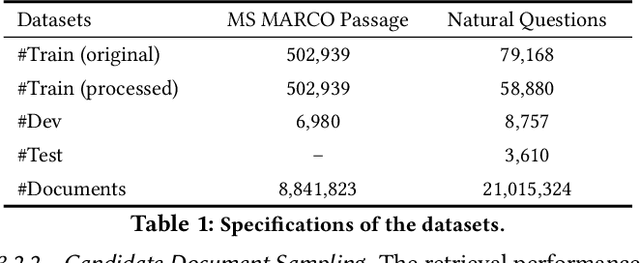
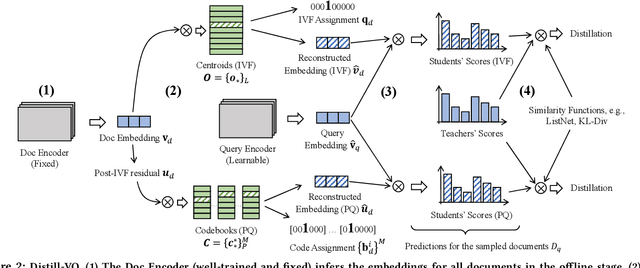
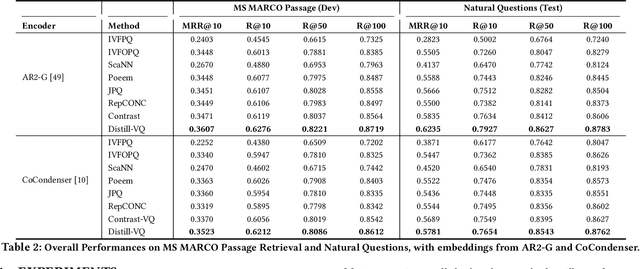
Abstract:Vector quantization (VQ) based ANN indexes, such as Inverted File System (IVF) and Product Quantization (PQ), have been widely applied to embedding based document retrieval thanks to the competitive time and memory efficiency. Originally, VQ is learned to minimize the reconstruction loss, i.e., the distortions between the original dense embeddings and the reconstructed embeddings after quantization. Unfortunately, such an objective is inconsistent with the goal of selecting ground-truth documents for the input query, which may cause severe loss of retrieval quality. Recent works identify such a defect, and propose to minimize the retrieval loss through contrastive learning. However, these methods intensively rely on queries with ground-truth documents, whose performance is limited by the insufficiency of labeled data. In this paper, we propose Distill-VQ, which unifies the learning of IVF and PQ within a knowledge distillation framework. In Distill-VQ, the dense embeddings are leveraged as "teachers", which predict the query's relevance to the sampled documents. The VQ modules are treated as the "students", which are learned to reproduce the predicted relevance, such that the reconstructed embeddings may fully preserve the retrieval result of the dense embeddings. By doing so, Distill-VQ is able to derive substantial training signals from the massive unlabeled data, which significantly contributes to the retrieval quality. We perform comprehensive explorations for the optimal conduct of knowledge distillation, which may provide useful insights for the learning of VQ based ANN index. We also experimentally show that the labeled data is no longer a necessity for high-quality vector quantization, which indicates Distill-VQ's strong applicability in practice.
Uni-Retriever: Towards Learning The Unified Embedding Based Retriever in Bing Sponsored Search
Feb 13, 2022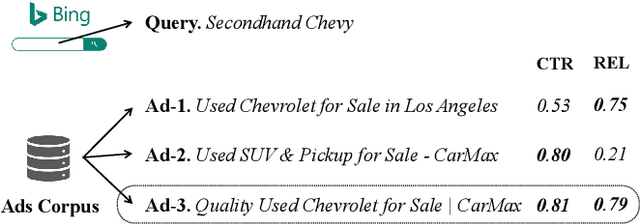
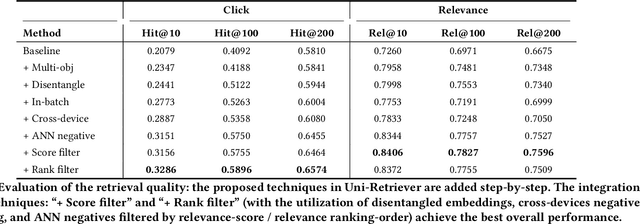


Abstract:Embedding based retrieval (EBR) is a fundamental building block in many web applications. However, EBR in sponsored search is distinguished from other generic scenarios and technically challenging due to the need of serving multiple retrieval purposes: firstly, it has to retrieve high-relevance ads, which may exactly serve user's search intent; secondly, it needs to retrieve high-CTR ads so as to maximize the overall user clicks. In this paper, we present a novel representation learning framework Uni-Retriever developed for Bing Search, which unifies two different training modes knowledge distillation and contrastive learning to realize both required objectives. On one hand, the capability of making high-relevance retrieval is established by distilling knowledge from the ``relevance teacher model''. On the other hand, the capability of making high-CTR retrieval is optimized by learning to discriminate user's clicked ads from the entire corpus. The two training modes are jointly performed as a multi-objective learning process, such that the ads of high relevance and CTR can be favored by the generated embeddings. Besides the learning strategy, we also elaborate our solution for EBR serving pipeline built upon the substantially optimized DiskANN, where massive-scale EBR can be performed with competitive time and memory efficiency, and accomplished in high-quality. We make comprehensive offline and online experiments to evaluate the proposed techniques, whose findings may provide useful insights for the future development of EBR systems. Uni-Retriever has been mainstreamed as the major retrieval path in Bing's production thanks to the notable improvements on the representation and EBR serving quality.
Progressively Optimized Bi-Granular Document Representation for Scalable Embedding Based Retrieval
Jan 14, 2022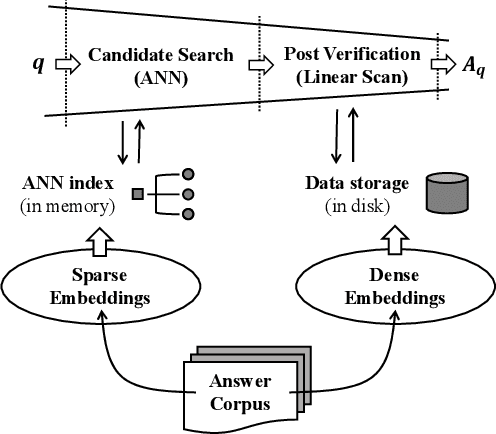
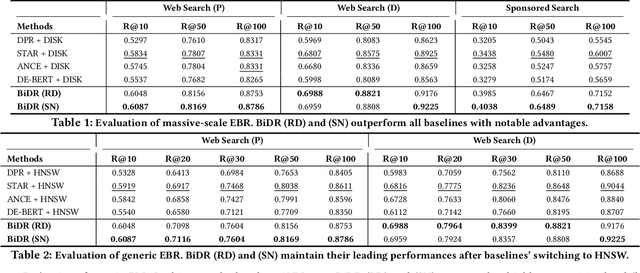
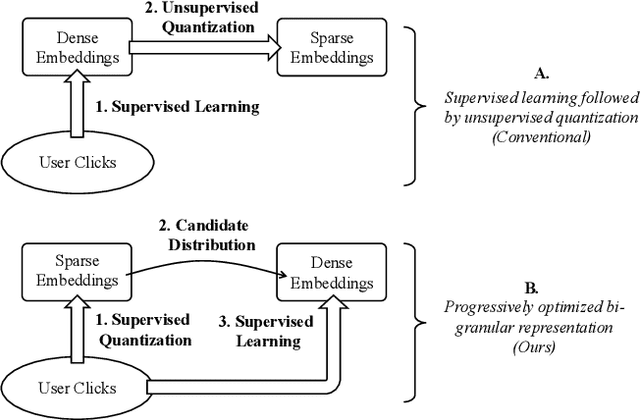
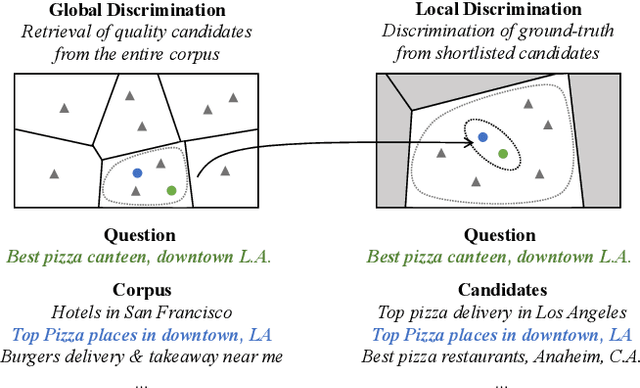
Abstract:Ad-hoc search calls for the selection of appropriate answers from a massive-scale corpus. Nowadays, the embedding-based retrieval (EBR) becomes a promising solution, where deep learning based document representation and ANN search techniques are allied to handle this task. However, a major challenge is that the ANN index can be too large to fit into memory, given the considerable size of answer corpus. In this work, we tackle this problem with Bi-Granular Document Representation, where the lightweight sparse embeddings are indexed and standby in memory for coarse-grained candidate search, and the heavyweight dense embeddings are hosted in disk for fine-grained post verification. For the best of retrieval accuracy, a Progressive Optimization framework is designed. The sparse embeddings are learned ahead for high-quality search of candidates. Conditioned on the candidate distribution induced by the sparse embeddings, the dense embeddings are continuously learned to optimize the discrimination of ground-truth from the shortlisted candidates. Besides, two techniques: the contrastive quantization and the locality-centric sampling are introduced for the learning of sparse and dense embeddings, which substantially contribute to their performances. Thanks to the above features, our method effectively handles massive-scale EBR with strong advantages in accuracy: with up to +4.3% recall gain on million-scale corpus, and up to +17.5% recall gain on billion-scale corpus. Besides, Our method is applied to a major sponsored search platform with substantial gains on revenue (+1.95%), Recall (+1.01%) and CTR (+0.49%).
 Add to Chrome
Add to Chrome Add to Firefox
Add to Firefox Add to Edge
Add to Edge